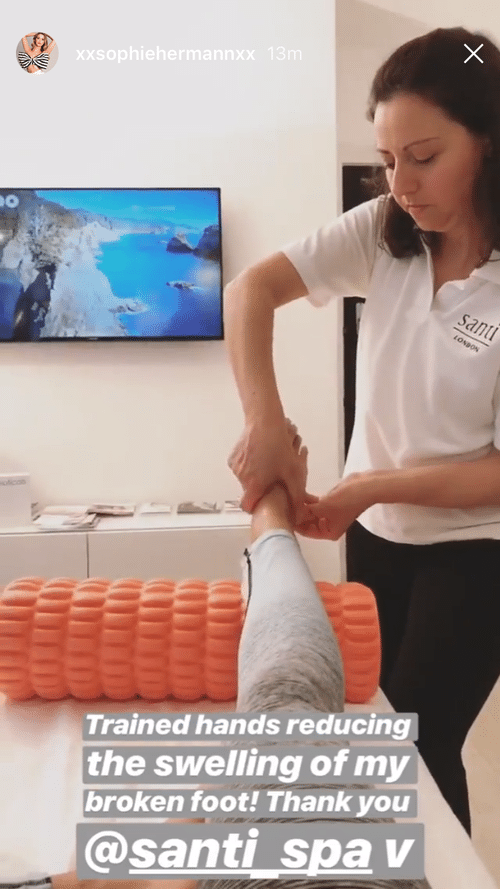Physiotherapy in South Kensington
Calm, evidence-informed assessment and treatment for back & neck pain, sports injuries, post-operative rehab, respiratory support and posture-related issues — with a clear plan from day one.
Physiotherapy that restores confidence in movement
At Santi, physiotherapy is designed to be both effective and calm. We combine hands-on care with progressive exercise therapy to reduce pain, restore function and support long-term resilience — without generic protocols or rushed appointments.
Clear diagnosis
We assess thoroughly and explain what we think is going on in plain language.
Day-one treatment
Manual therapy and practical exercises begin in your first session where appropriate.
Measurable goals
Time-boxed milestones and review points so progress feels tangible and realistic.
Joined-up care
We can liaise with your GP/consultant and coordinate supportive services at Santi.
Conditions we commonly treat
What to expect at Santi
Thorough assessment
History, movement testing and clinical reasoning to identify contributing factors — not just symptoms.
Hands-on treatment
Manual therapy where appropriate (mobilisation, soft-tissue, joint techniques) to reduce pain and restore motion.
Plan & exercises
A personalised home programme with milestones. We refine progressions based on response at follow-ups.
Techniques & modalities
Manual therapy
Joint mobilisation, soft-tissue techniques, trigger-point work and stretching.
Exercise therapy
Strength, mobility, motor-control and return-to-activity progressions.
Post-op protocols
Structured pathways for ACL, rotator cuff, spinal and joint procedures.
Posture & ergonomics
Desk set-up advice, pacing strategies and flare-up prevention.
Taping & supports
Adjuncts that can help movement feel safer while symptoms settle.
Pain education
Simple explanations so you know what to expect and how to self-manage.
Is physiotherapy right for you?
Great fit
Musculoskeletal pain/injury, stiffness, return-to-sport, post-operative recovery, or recurrent flare-ups.
We’ll redirect
If symptoms suggest urgent pathways (e.g., significant neurological changes, fever, major trauma, severe unrelenting pain).
Joined-up care
We can liaise with your GP/consultant and coordinate supportive therapies at Santi.
Clear outcomes
Time-boxed goals with review points so progress is visible and expectations stay realistic.
Safety note
If you have symptoms that feel urgent or severe, please seek immediate medical advice. Physiotherapy is not an emergency service.
Do I need a GP referral?
No — you can self-refer. If imaging or onward referral is needed, we’ll guide you.
What should I wear?
Comfortable clothing that allows movement; we may need to see and assess the affected area.
How many sessions will I need?
It varies by condition and goals. We’ll outline an estimated pathway after your first appointment and refine it as you progress.
Is physiotherapy suitable for older adults?
Yes — plans are tailored to your baseline strength, balance, health history and confidence in movement.
Meet your physiotherapists

Elizabeth
Musculoskeletal PhysiotherapistElizabeth brings over 20 years of clinical experience in complex rehabilitation and injury management, with a particular focus on spinal and upper-limb conditions. Her approach is calm, precise and confidence-building — helping patients understand their bodies and regain trust in movement.

Maria
Respiratory & Musculoskeletal PhysiotherapistMaria integrates respiratory expertise with musculoskeletal rehabilitation, offering a grounded, whole-body approach to recovery. Sessions prioritise functional movement, breathwork and practical home guidance to support long-term improvement — particularly for those recovering from illness, surgery or persistent symptoms.
We are a multi-disciplinary wellness clinic based in South Kensington
Here at Santi Physiotherapy we have a team of highly specialised clinicians with vast experience in the assessment and treatment of complex neuromusculoskeletal conditions. Your physiotherapist will undertake a thorough clinical examination and assessment on your first appointment in order to provide you with a diagnosis and reasoning behind your symptoms. We will provide you with a comprehensive overview of our findings and provide you with the most up to date evidence based treatment specifically for your needs. We have access to a fully equipped gym where we carry out specific assessment and treatment programmes and four treatment rooms in a quiet calm environment.
Physiotherapy
Sports and Deep Tissue Massage
Remedial Pilates
Maria
Is a highly specialsied physiotherapist with over 20 years of clinical experience. With an undergraduate degree in physiotherapy, a Masters from St Georges and MRes research degree from Kings London.
Elizabeth
Elizabeth is a highly qualified musculoskeletal physiotherapist with more than two decades of clinical experience in complex rehabilitation and injury management.
After completing her MSc in Metabolic Bone Diseases at the National and Kapodistrian University of Athens, she developed a specialist focus on upper-limb and spinal conditions, combining scientific insight with finely tuned clinical judgement.
Sessions with Elizabeth are grounded in calm, positive guidance, with particular attention to posture, movement quality, stress reduction, and helping you feel more in control of your body. Her philosophy is simple: true healing goes beyond treating symptoms — it’s about restoring confidence, balance, and wellbeing.
Outside the clinic, Elizabeth enjoys spending time with her family and friends, and finds joy in swimming and tennis.


What are the benefits of physiotherapy?
Physiotherapy, also known as physical therapy, is a healthcare profession that uses various physical techniques, exercises, and equipment to help patients restore and maintain their physical function, mobility, and strength. Here are some of the benefits of physiotherapy:
Pain relief:
Physiotherapy can help alleviate pain caused by various conditions such as sports injuries, back pain, and arthritis.
Improved mobility:
Physiotherapy can help patients regain or improve their mobility and movement after an injury, surgery, or illness.
Prevention of injury:
Physiotherapy can help prevent injuries by improving strength, flexibility, and balance.
Improved quality of life:
Physiotherapy can improve a patient’s overall quality of life by helping them perform daily activities and improving their physical and mental health.
Management of chronic conditions:
Physiotherapy can help manage chronic conditions such as heart disease, diabetes, and respiratory disorders.
Faster recovery:
Physiotherapy can help speed up recovery after surgery or an injury, reducing the length of hospital stays and the need for medication.
Personalized treatment:
Physiotherapy treatment is personalized to the individual patient, taking into account their unique needs and goals.
Education and guidance:
Physiotherapists can provide patients with education and guidance on how to maintain their physical health and prevent future injuries.
Overall, physiotherapy can be a valuable tool for promoting physical health and well-being, improving quality of life, and preventing and treating a wide range of conditions.
Top 5 Physiotherapy Exercises for Injury Prevention and Recovery
Physiotherapy plays a crucial role in injury prevention and recovery by promoting strength, flexibility, and overall musculoskeletal health. Whether you’re an athlete, a fitness enthusiast, or simply looking to maintain an active lifestyle, incorporating physiotherapy exercises into your routine can significantly reduce the risk of injuries and aid in the rehabilitation process. In this comprehensive guide, we will explore the top five physiotherapy exercises recommended by experts to prevent injuries and accelerate recovery.
Exercise 1: Glute Bridges
Glute bridges are a fundamental physiotherapy exercise that targets the gluteal muscles, lower back, and core. To perform a glute bridge, lie on your back with your knees bent and feet flat on the floor. Place your arms by your sides, palms facing down. Engage your core muscles and press your feet into the ground to lift your hips off the floor until your body forms a straight line from shoulders to knees. Hold the position for a few seconds, then lower your hips back down. Repeat for several repetitions.
This exercise is beneficial for injury prevention as it strengthens the glutes and core, which are essential for maintaining proper posture and stability during various activities. Additionally, glute bridges help alleviate lower back pain and improve hip mobility.
Exercise 2: Clamshells
Clamshells are another effective physiotherapy exercise that targets the hip abductor muscles. To perform clamshells, lie on your side with your knees bent, and stack your hips and shoulders on top of each other. Keep your feet together and lift your top knee while keeping your feet touching. Lower the knee back down. Repeat for several repetitions on each side.
Clamshells are excellent for preventing and rehabilitating hip and knee injuries, as they strengthen the hip abductor muscles responsible for stabilizing the pelvis during movement. This exercise is particularly beneficial for runners and athletes involved in lateral movements.
Exercise 3: Shoulder External Rotations
Shoulder external rotations are essential for maintaining shoulder joint stability and preventing rotator cuff injuries. To perform this exercise, stand with your arms by your sides, holding a resistance band or a light dumbbell in one hand. Keep your elbow bent at 90 degrees and your upper arm parallel to the floor. Slowly rotate your forearm outward, keeping your elbow close to your body. Return to the starting position and repeat for several repetitions on each arm.
By strengthening the external rotators of the shoulder, this exercise improves shoulder stability and reduces the risk of shoulder impingement and other related injuries. It is particularly beneficial for individuals who perform repetitive shoulder movements, such as swimmers and tennis players.
Exercise 4: Wall Angels
Wall angels are an excellent physiotherapy exercise for improving posture and shoulder mobility. Stand with your back against a wall, feet shoulder-width apart, and your arms bent at a 90-degree angle with your elbows and wrists touching the wall. Slowly slide your arms up the wall while keeping your elbows and wrists in contact with the wall. Stretch your arms overhead, then slowly return to the starting position. Repeat for several repetitions.
This exercise helps prevent and alleviate shoulder and neck pain caused by poor posture and tight chest muscles. It also strengthens the muscles in the upper back and shoulders, promoting better alignment and reducing the risk of strain and overuse injuries.
Exercise 5: Single-Leg Deadlifts
Single-leg deadlifts are a challenging but effective physiotherapy exercise for improving balance, stability, and lower body strength. Stand with your feet hip-width apart and shift your weight onto one leg while keeping a slight bend in the knee. Hinge at the hips and lower your torso while lifting the other leg behind you. Keep your back straight and extend your arms towards the floor. Return to the starting position and repeat for several repetitions on each leg.
This exercise targets the hamstrings, glutes, and core, enhancing lower body strength and stability. It is especially beneficial for individuals recovering from lower back injuries and those looking to improve their balance and proprioception.
Incorporating these top five physiotherapy exercises into your fitness routine can significantly reduce the risk of injuries and accelerate the recovery process. Each exercise targets specific muscle groups and addresses common areas of weakness and vulnerability. By performing these exercises regularly and under the guidance of a qualified physiotherapist, you can build a strong, resilient body that is better equipped to handle the demands of everyday activities and sports.
Remember to consult with a healthcare professional or physiotherapist before starting any new exercise program, especially if you have existing injuries or medical conditions. Stay consistent, listen to your body, and make gradual progress to achieve optimal results and enjoy a lifetime of injury-free movement.
The Benefits of Physiotherapy in South Kensington: Why Choose Santi London
Physiotherapy plays a crucial role in enhancing the overall quality of life for individuals experiencing pain, injury, or mobility issues. At Santi London in South Kensington, we provide specialized physiotherapy services designed to address a wide range of physical conditions and promote optimal health.
Understanding Physiotherapy
Physiotherapy is a healthcare profession dedicated to the assessment, diagnosis, treatment, and prevention of physical dysfunction and pain. Our experienced physiotherapists at Santi London use evidence-based techniques and personalized treatment plans to help patients recover from injuries, manage chronic conditions, and improve their physical performance.
Why Choose Santi London for Physiotherapy?
Expertise and Experience: Our team of physiotherapists are highly trained and possess extensive experience in treating various musculoskeletal, neurological, and sports-related conditions.
Personalized Care: We believe in a patient-centered approach. Each treatment plan is tailored to the individual’s specific needs, ensuring effective and efficient recovery.
State-of-the-Art Facility: Located in the heart of South Kensington, our clinic is equipped with the latest technology and modern amenities to provide the highest standard of care.
Comprehensive Services: From manual therapy and exercise prescription to electrotherapy and ergonomic advice, we offer a wide range of physiotherapy services to cater to all your health needs.
Common Conditions Treated
- Back and Neck Pain: Whether it’s due to poor posture, injury, or degenerative conditions, our physiotherapists can help alleviate pain and restore function.
- Sports Injuries: We provide specialized care for athletes of all levels, focusing on injury prevention, treatment, and performance enhancement.
- Post-Surgical Rehabilitation: Our post-operative rehab programs are designed to speed up recovery and help patients regain strength and mobility.
- Chronic Pain: Conditions such as arthritis, fibromyalgia, and chronic fatigue syndrome can be effectively managed with physiotherapy.
The Role of Physiotherapy in COVID-19 Recovery
The COVID-19 pandemic has highlighted the importance of physiotherapy in recovery from respiratory conditions. Patients recovering from COVID-19 may experience prolonged weakness, fatigue, and respiratory issues. Our physiotherapists at Santi London are trained to provide rehabilitation for post-COVID patients, helping them regain strength, improve lung function, and return to their daily activities.
Community Engagement in South Kensington
At Santi London, we are committed to the South Kensington community. We actively participate in local health initiatives and collaborate with other healthcare providers to promote wellness and preventive care.
Book Your Appointment Today
If you’re experiencing pain, recovering from an injury, or looking to improve your physical health, don’t hesitate to contact Santi London. Our dedicated team is here to support you on your journey to recovery and well-being. Book your physiotherapy appointment today and take the first step towards a healthier, pain-free life.
